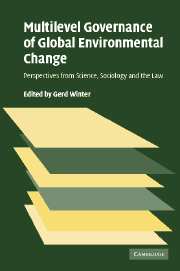 Multilevel Governance of Global Environmental Change
Multilevel Governance of Global Environmental Change Book contents
- Frontmatter
- PREFACE
- Contents
- List of figures
- List of tables
- Notes on contributors
- List of abbreviations
- 1 Introduction
- PART I Earth system analysis
- PART II Society and institutions of global; environmental change
- PART III Self-regulation of industry and the law
- PART IV The potential of the state
- PART V The potential of world regions
- PART VI Formation and implementation of international regimes
- PART VII Improving the instruments of global governance
- PART VIII Fundamental concepts of institutionalising common concern
- 21 Global environmental change and the nation state: sovereignty bounded?
- 22 Whose environment? Concepts of commonality in international environmental law
- 23 Globalising environmental liability: the interplay of national and international law
- 24 The legal nature of environmental principles in international, EU, and exemplary national law
- Index
24 - The legal nature of environmental principles in international, EU, and exemplary national law
Published online by Cambridge University Press: 04 May 2010
- Frontmatter
- PREFACE
- Contents
- List of figures
- List of tables
- Notes on contributors
- List of abbreviations
- 1 Introduction
- PART I Earth system analysis
- PART II Society and institutions of global; environmental change
- PART III Self-regulation of industry and the law
- PART IV The potential of the state
- PART V The potential of world regions
- PART VI Formation and implementation of international regimes
- PART VII Improving the instruments of global governance
- PART VIII Fundamental concepts of institutionalising common concern
- 21 Global environmental change and the nation state: sovereignty bounded?
- 22 Whose environment? Concepts of commonality in international environmental law
- 23 Globalising environmental liability: the interplay of national and international law
- 24 The legal nature of environmental principles in international, EU, and exemplary national law
- Index
Summary
Much has been said about the semantic content of various environmental as well as other principles, but there is less clarity about their legal nature. This chapter will propose a general concept of principles which can be applied to all levels of the law, national, regional, as well as international. The concept views principles as a transmission belt between societal common sense and the law. If seen in this light, principles can help to accelerate the making of environmental law, so much needed at a time of asynchronie between the speed of global environmental change and the slowness of institutional response. I will begin with a short overview of the rhetoric of environmental ‘principles’, and develop a definition of ‘principle’ suggesting that there are different definitions for different legal contexts in which ‘principles’ appear.
Overview of environmental propositions called principles
In international law, three environmental propositions are widely cited as principles, namely the sovereign right of states over their natural resources, the procedural duty between states to cooperate in mitigating environmental risks and emergencies, and the substantive duty to prevent, reduce, and control imminent and serious environmental harm. These principles are recognised as rules of international customary law. They can also be regarded as ‘principles of international law’. The third – prevention of serious harm – may even qualify as a ‘principle of peremptory law’ (ius cogens).
- Type
- Chapter
- Information
- Multilevel Governance of Global Environmental ChangePerspectives from Science, Sociology and the Law, pp. 587 - 604Publisher: Cambridge University PressPrint publication year: 2006
- 1
- Cited by


